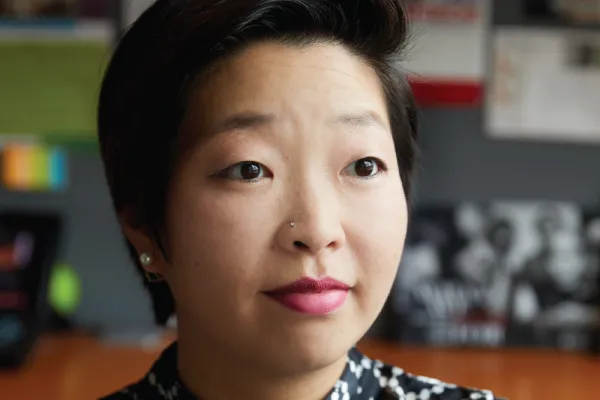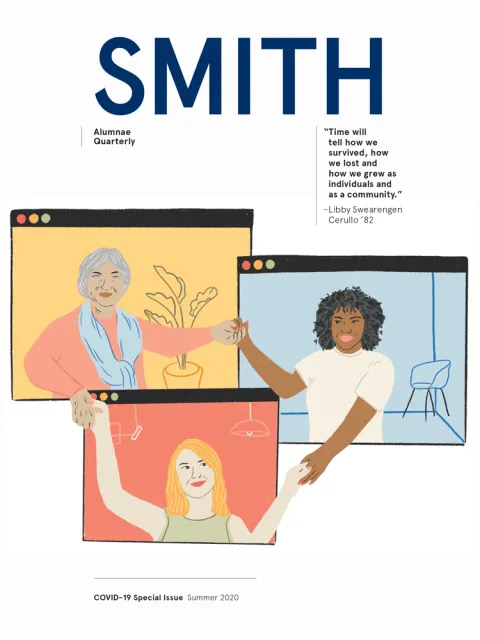Racialization of Infectious Disease
Alumnae News

Published June 18, 2020
When Sherry Wang ’06 was 6 years old, she and her family immigrated to the United States from Taiwan. The experience, she says, was fraught with emotion—and later informed her decision to study psychology at Smith and work with immigrant populations on mental health issues.
After graduating from Smith, Wang earned a doctorate from the University of Nebraska–Lincoln and has maintained her interests in the Asian American immigrant experience; however, her scholarly work has also expanded to encompass a range of issues that affect the health of marginalized communities. “I’m interested in the intersectionality of oppression when it comes to race, region of the country, socioeconomic status, sexual orientation, gender expression and how that impacts health, mental health and health care,” she explains.
Even before the country went into a nationwide lockdown in response to the COVID-19 pandemic, Wang, who is an assistant professor of counseling psychology at Santa Clara University, was already calling attention to the uptick in violence and discrimination against Asian Americans in her home state of California. She continues to sound the alarm about the ways that people of color will disproportionately suffer from this insidious disease.
As a journalist who covers race and diversity in the United States, I was eager to talk to Dr. Wang about her thoughts on the intersection of race and COVID-19. Highlights from our conversation follow.
What is the connection between race or ethnicity and disease? How do these two concepts come together with the COVID-19 crisis?
Infectious diseases are not new to our society. And if you just think back to the last few that we have had, they have been racialized in the sense that we, as a society, want to attribute them to a particular group of people. With SARS it was Asians, particularly Chinese people; bird flu as well. With swine flu, we really targeted Mexicans, particularly Mexican immigrants. With Ebola it was Africans who supposedly had the disease. Americans tend to be like, “Oh yeah, of course these people must be bringing the disease in,” even though we know that infectious diseases do not scientifically target particular people on the basis of race.
How are specific racial groups in the United States experiencing discrimination in regard to the pandemic?
We have been seeing really brutal attacks against Asian Americans. And I think that’s been the pain for many Asian Americans who didn’t know just what our history has been like in this country and how much we continue to be outsiders. With African Americans, we’re seeing the results of historical neglect. The disproportionate fatalities of African Americans are not purely due to COVID-19 or underlying conditions. It is actually the structural inequities of systems that have persisted over time. We’re talking about lack of health care access, poverty, housing insecurity and intergenerational trauma. Also, a lot of black and brown community members are not able to stay home because many are considered essential workers. Not only are their risks higher in terms of being exposed to sickness right now, but we see all of those underlying issues that have built up over time.
How do you think race is going to affect the outcome of who survives this pandemic and who doesn’t?
My concern with COVID-19 has been and will continue to be that even when a vaccine comes out, there are still going to be particular demographics of people who are not going to be able to have access to it. And it’s going to be black people. It’s going to be brown people. It’s going to be poor people. It’s going to be people living in rural areas. It’s going to be people who have historically been marginalized by our society and by our institutions.
What do you think individuals can and should be doing to diminish discrimination in both the treatment and attacks against marginalized communities?
It’s critical to advocate for the experiences of other groups. I have been emphasizing the importance of solidarity and bystander interventions, and for us to really advocate for one another because these issues of race, discrimination and health disparities can’t always be spoken of by people of color; it will never have that same impact or receive the same kind of attention as it would if everybody spoke up about it. And particularly if white people said, “You know what, what’s happening to the black community is unacceptable. You know, what we’re seeing in the Asian American community, we can’t have that continue to happen.” We need them to speak up to really make a difference.
Do you see anything positive coming out of this global crisis?
Yes, I do, actually, in two distinct ways. One, there’s renewed and consistent attention on these key issues we’ve been discussing with COVID-19: the racialization of infectious diseases, the lack of access to care and how health disparities are very much racialized—that’s exciting from a health care perspective. I’m hopeful these discussions will carry over into other areas, like HIV care. The other thing is that we’re seeing and hearing amazing stories from different communities across the world where people are standing up, coming together and offering themselves in ways that we haven’t seen before on this scale. So that gives me hope.
Lori L. Tharps ’94 is an associate professor of journalism at Temple University, an author and speaker. She is the host of the podcast and blog My American Meltingpot.
This story appears in the Summer 2020 issue of the Smith Alumnae Quarterly.
SMITH ALUMNAE QUARTERLY

A Semester Like No Other: How the class of 2020 left campus with a proper send-off.
Smith’s All-Hands Crisis Response: Entire campus community takes up an array of challenges presented by a dangerous pandemic.
Connection Out of Isolation: 12 voices collaborate on a poem for our time.
Mission to Make Masks: Students, staff rev up sewing machines to fill a community need.
One Student: Studio art major Sophie Willard Van Sistine ’22 finds her niche writing comics.
Race for a Vaccine: Dr. Annie De Groot ’78 and her biotech firm are on the front line to stop COVID-19 in its tracks.
Virtual Togetherness: Quarantines fall away as Smith friends Zoom into one another’s living rooms.
Echoes of a Pandemic: From canceled classes to campus quarantines, effects of the 1918 Spanish flu ring familiar.
Finding the Funny: An improv comedian’s tips for staying sane in the pandemic.
How Can I Help? From online classes to concerts and community fundraisers, alumnae find creative ways to ease the burden of those in need.
The Morning Call That Never Came: Death of a parent in the age of COVID-19 carries an extra layer of grief.
Racialization of Infectious Disease: As viruses spread, so does discrimination against marginalized groups.
Dawn of a New Day: Faith leaders impart messages of hope, acceptance and belief in our collective power to work for a better world.
Photograph by Jen Siska